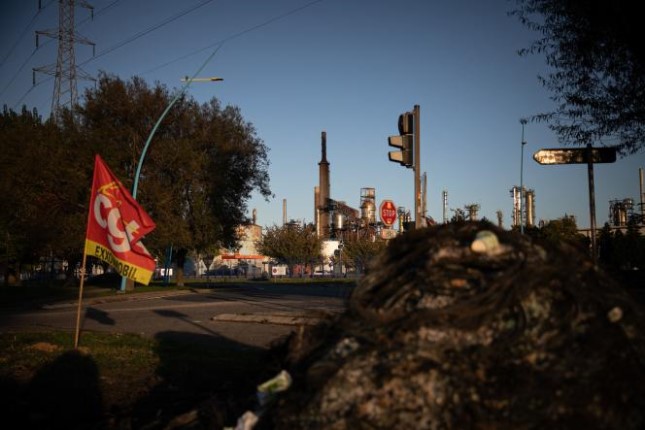They face a six-month prison sentence or a €10,000 fine. Two workers were requisitioned to resume fuel deliveries on Wednesday evening, and two more Thursday morning.
Workers at the ExxonMobil fuel depot in Dunkirk are also on strike. In response to Borne’s threats on Tuesday, the strike spread Wednesday morning, as workers at the Donges refinery and maintenance workers at five nuclear reactors walked out. Now six out of France’s seven oil refineries are on strike. By Wednesday night, 30.8 percent of petrol stations in France had no fuel.
The Macron government’s action is a frontal attack on the democratic right to strike. This right was guaranteed in the French constitution after the fall of the Nazi-collaborationist Vichy regime, which formally outlawed the class struggle during World War II.
This action follows the precedent of the Sarkozy government’s use of the requisition order against refinery workers in 2010 to crush strikes that were ultimately isolated by the union bureaucracies. Today, the Macron government is mounting a massive offensive against the working class at a much more developed stage of the world capitalist crisis.
Macron’s aggressive actions are setting into motion an explosive confrontation between the police-state machine and the working class. The state aims to suppress strikes against inflation, in the refineries and by workers far more broadly. A wave of struggles is erupting in France and internationally amid a devastating surge in inflation, energy shortages, a resurgence of the pandemic, and the escalating war between NATO and Russia in Ukraine.
French refinery workers are not alone in facing state repression of this kind. In the United States, rail workers have been ordered back to work by the Biden administration, while British rail workers face similar threats as they mount ongoing strikes against pay-cuts and deteriorating working conditions.
Four workers have been requisitioned by the government in line with Exxon’s demand that deliveries restart immediately. Since the refinery strikes began on September 27, the distribution of processed oil has stopped alongside the refining process itself, costing the French petrochemical industry eight million euros a day.
The Macron government aims to attack ever wider sections of the Exxon and Total workforces in the coming days. Following the first requisitions, French government spokesperson Olivier Véran echoed Borne’s threats to requisition Total workers, who are also on strike. Véran also pointed to striking workers at the Exxon fuel depot in Dunkirk, a crucial link in the French petrochemical supply chain.
The crucial question facing workers in struggle in France is breaking free of the trade union bureaucracies and forming their own rank-and-file movement to struggle against the government, the major corporations, and the capitalist system itself. If the strike stays under the control of the union bureaucracies, it will be politically strangled.
The leaders of the CFDT and CFE-CGC unions already tried to sell out the strike on Tuesday, signing a government-backed contract with a 5.5 percent pay rise, which given inflation of nearly 7 percent was a wage cut. However, their efforts to end the strike failed, as walkouts continued Wednesday morning.
Having seen the angry response of the rank-and-file to the CFE-CGC and CFDT’s attempts to end the strike, the CGT insists that it will struggle against the government. In a statement on Wednesday, the CGT denounced the CFE-CGC and CFDT as the action of “pseudo-unions” and criticized their betrayal of their members.
However, the CGT is privately continuing its long-standing policy of “social dialogue” with Macron and his ministers, preparing its own betrayal of the rank-and-file. Behind closed doors, CGT chief Philippe Martinez is desperately trying to negotiate a concessions contract with the government that can be forced upon the union’s members. Martinez had private phone calls with Borne on Friday and with Energy Minister Agnès Pannier-Runacher on Monday.
After touring the Port Jérôme site on Wednesday night to “support” striking workers, the only action Martinez announced was a legal challenge against the requisition orders. Martinez said, “I don’t think that requisitioning striking workers is the best way to have a dialogue.”
A class gulf separates Martinez, who speak for a layer of union bureaucrats desperate to shut down the strikes and ultimately reach a deal with Macron, from the working class, who are angry at the collapse of purchasing power and increasingly concerned about war.
As the right to strike is under direct attack in France, workers are faced with economic ruin and the threat of the use of nuclear weapons in the NATO-Russia conflict. The impact of the strike of refinery workers has demonstrated the immense power of the working class. Amidst these conditions, the CGT could mobilize its 700,000 members, many of whom are in crucial industries for France’s economy, to bring down the widely hated Macron government.
However, the bureaucracy will not take such action, which it in fact opposes. The bureaucrats’ privileges are sustained by the super-profits of the very corporations that refinery workers are struggling against. This is the economic basis of the unions support the capitalist class’s policy of war, multi-trillion-euro bailouts for the corporations, and massive austerity for the working class.
Waging the struggle against Macron requires a decisive break with the union bureaucracies and taking action to form worker-controlled, rank-and-file committees. This must be coordinated with struggles across multiple industries worldwide through the construction of the International Workers Alliance of Rank-and-File Committees.
Source: World Socialist Web Site.































